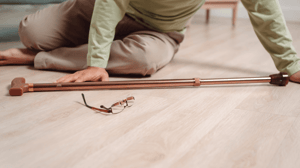The device (which can be easily installed in the home, or in hospitals) measures gait in real time and identifies people at risk. It can also help detect early symptoms of Alzheimer's.
Falls in the elderly, which often mean the start of other possibly serious problems, could be prevented with the help of a mini radar. This user-friendly device can be easily installed in the home, in hospitals and in other care settings. It could be used to protect the elderly (in particular) who may suffer from Alzheimer's and other neurodegenerative diseases that also affect balance and spatial awareness, more effectively.
The device was developed by bioengineers at Chalmers University of Technology in Gothenburg, Sweden. The features of this mini radar (which, in technical terms, falls into the category of millimetre-wave frequency-modulated continuous wave radars) are described in the scientific journal Sensors. In short, this little sensor (a similar size to a smoke detector) can create a high-resolution map of a person's gait, in particular by measuring the time it takes them to take a step. “Changes in step timing are the key," explains Xuezhi Zeng, the main author of the study.
From interpreting gait to recognising Alzheimer's symptoms
A healthy person usually has a regular gait, while a person at risk of falls often shows a large variation in the timing of steps. For example, the first step may take one second, while the second may take two.
As well as being easy to use, this mini radar also has the advantage of collecting real-time data without needing to film. “This means,” Zeng continues, “that it can be used without invading people's privacy and without the feeling of being monitored that a camera would cause.”
Knowing that a person means you can plan the best countermeasures, like targeted physiotherapy, where possible, or moving furniture to prevent accidents. But the mini radar may also help to diagnose Alzheimer's early, when the disease is not yet showing obvious signs and is difficult to detect, as an increase in variations in gait timings is in many cases closely linked to the issues caused by this disease.
Savings for the healthcare system
If the mini radar use were widespread, the authors point out, there would also be tangible economic benefits, as a lot of money would be saved without the need for hospitalisations, operations and rehabilitation. In Sweden alone, around 100,000 over-65s suffer a fall that requires medical treatment every year, and in 70% of cases this includes hospitalisation. This situation is not unique to Sweden. For example, in the US it is estimated that 3 million elderly people go to the emergency room every year due to falls.




